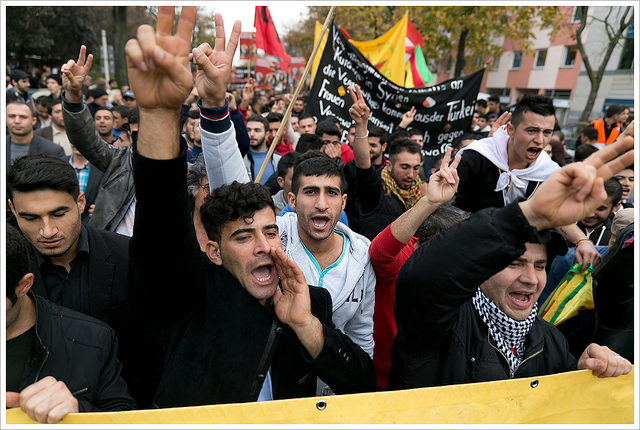Terrorism does not destroy, provided we restrain our excusable instinct to dive into the false security of a police state
The attacks in Paris have shocked the world, with governments seeking to enhance security measures to prevent such tragic events repeating themselves. Conor Gearty looks at the motives and tactics of terrorist groups, and argues that groups like “Islamic State” ultimately cannot build but only destroy, which is why our civilisation will endure provided we resist the inevitable instinct to resort to building a police state.

A “Berlin against ISIS” march from last year (Credit: Montecruz Foto, CC BY SA 2.0)
If the term ‘terrorism’ has any meaning, then the attacks in Paris and Mali surely fall squarely within it. Here was indiscriminate violence against non-combatants that was intended to communicate a message of a political sort. The victims were not even plausibly guilty of anything from the perspective of their killers: their innocence was their point.
The question of what message was intended is murkier.
It is too early to speculate about the intentions behind the Mali assault. But the drivers behind Paris are well-known. There is little doubt that the operation was one emanating in some form or other from what we have grown used to calling Islamic State, or Daish as the UK government spend some unnecessary effort a little while back trying to persuade us to call it. Messages need audiences and there were a number that the organisers of the assault in Paris were likely to have had in mind.
First, there was the message to the group itself, Islamic State and its fan base, people of a radical Islamist bent (whose loyalties may deepen into active support for the organisation at some point) who are judged to need regular reminding that here are the hottest, most brutal killers in town. Islamic State needs to guard against being out-terrorised on its flank, having done to them what they did a while back to Al Qaida. This ‘spectacular’ (as the IRA used to call such dramatic interventions albeit their actions were never remotely as callous as this) puts that fear to rest, at least for the time being, although Mali may be an effort at emulation by rivals.
A second audience for Paris are Western governments: ‘this is what you get when you bomb us’ is the jubilant cry. However pleasing it may not be the cleverest of actions in strategic terms, less a bold act of deterrence that a piece of counter-productive bullying – a prisoner surrounded by heavy artillery who beats a weak family member of the opposing general to death in full view of his heavily armed enemy. Naturally there will be more bombing not less, and just as with Al Qaida when they were rooted in a piece of land – Afghanistan – Islamic State can hardly just run into caves and forsake their Caliphate. Already within just a few days, their territory is being truncated and fragmented by a ratcheting up of aerial violence to which Islamic state can offer no resistance. (In a normal war countries often try such ‘terrorism’ in the enemy’s heartlands but never in situations of such appalling power asymmetry as we find here, where retaliation is so easy and so devastating).
Being neither strategic nor tactical, the remaining two messages from Paris are not susceptible of being assessed for coherence in the way that we can test the first two.
The third is emotional, not rational – and a classic motive for acts of terrorism all over the world: ‘feel our pain’. This is what motivated the assault on the Munich Olympics as long ago as 1972, as the ‘last will and testament’ of the attackers (the you-tube video of its day) made clear. ‘Look what it’s like to die’ is a powerful shout but all it offers is some brief and rather desperate satisfaction before its inevitable effect in the shape of even more of the suffering to which it was a response.
Fourth and linked to an understanding of the reaction that terrorism of this sort is almost bound to provoke, is an old idea from the urban guerrillas of the 1960s, that by provocation you can force overreactions which foster alienation and deliver support to your side. Islamic State use horrible violence the way the Italian right did with their mass casualty bombs in the 1960s, to increase tension, foster division, increase alienation. They hope to be beneficiaries of the resulting polarisation. IRA were quite good at this but then their enemy never resorted to the mass killing that such a strategy invites: that is what happened to the South American insurgents who had tried to put their theories about provoking repression into practice in (among other places) Uruguay, Argentina and Brazil: they got military regimes not at all fazed by retaliatory terror on a vast scale. The provocation produced their obliteration, not wider public support.
It is likely that Islamic state will go the way of Al Qaida. They can destroy but they cannot build. Like the violence deployed by an early inspiration, the Al Qaida renegade Abu Musab al-Zarqawi, their propensity towards extreme bloodshed is likely to lead to resistance, both within and on the margins of their ‘Caliphate’. Whereas their success up to now has been in the spaces left by global and regional powers pursuing other agendas, their vulnerability is likely to become increasingly evident as their tactical successes (such as in Paris) have the counter-productive effect of securing for them the undivided attention of their foes.
But when they are beaten what then? Islamic State may disappear, but after them there will be others: the collapse of the 20th century post-Ottoman arrangements combined with the inescapabilities of modernism (neo-liberal hegemony; alienation; technological opportunity; ease of movement) make this inevitable.
And what of Europe’s reaction to Paris?
After the 11 September 2001 attacks, the US sought to reconstruct its constitution along quasi-military presidential lines. Long on the wish list of influential Republicans like Dick Cheney, 11 September gave them their chance, with the Administration’s response in this direction clearly going with rather than against the grain of a leadership already predisposed to extend its power.
In 2015, the attacks may drive immigration control further and faster; indeed they have already underpinned the isolationist instincts of some of the more inward-looking European states. The atrocities will make it harder than ever to resist government arguments in favour of surveillance and increased counter-terrorist actions (including deliberate killing). Security against the repeat of identical attacks will be tightened up.
But life will go on – until the next blip caused by the next spectacular. Unless these murderous events were to become a regular occurrence they remain incapable on their own of dislodging the European way of life. For all its horrors, terrorism of this sort remains ‘the weapon of the weak’, occasional typhoons of horror that frighten, shock, destabilise, stimulate increases in police power for sure, but ultimately do not destroy – as long as we keep our heads and restrain our excusable instinct to dive into the false security of a police state.
—
Note: this post represents the views of the author and not those of Democratic Audit UK or the LSE. Please read our comments policy before posting.
—
 Conor Gearty is a Professor of Law at the LSE, and the Director of the Institute of Public Affairs. His LSE profile page can be found here.
Conor Gearty is a Professor of Law at the LSE, and the Director of the Institute of Public Affairs. His LSE profile page can be found here.





 Democratic Audit's core funding is provided by the Joseph Rowntree Charitable Trust. Additional funding is provided by the London School of Economics.
Democratic Audit's core funding is provided by the Joseph Rowntree Charitable Trust. Additional funding is provided by the London School of Economics.
Terrorism does not destroy, provided we restrain our instinct to dive into the false security of a police state https://t.co/L6ZNuqI5Os
Terrorism does not destroy, provided we restrain our excusable instinct to dive into the false security of a polic… https://t.co/xyYw5F2fuO
“It is likely that IS will go the way of Al Qaida. They can destroy but they cannot build” https://t.co/dxhKH5yqOF https://t.co/xumCuZUvre
“Messages need audiences & there were a number that the organisers of the assault in Paris were likely to have had” https://t.co/dxhKH5yqOF
Terrorism does not destroy, IF we restrain our excusable instinct to dive into the false security of a police state https://t.co/NxfEDYcB6i
Terrorism does not destroy, provided we restrain our excusable instinct to dive into the… https://t.co/fD1ZoY7aX8 https://t.co/8G4tEeSchP